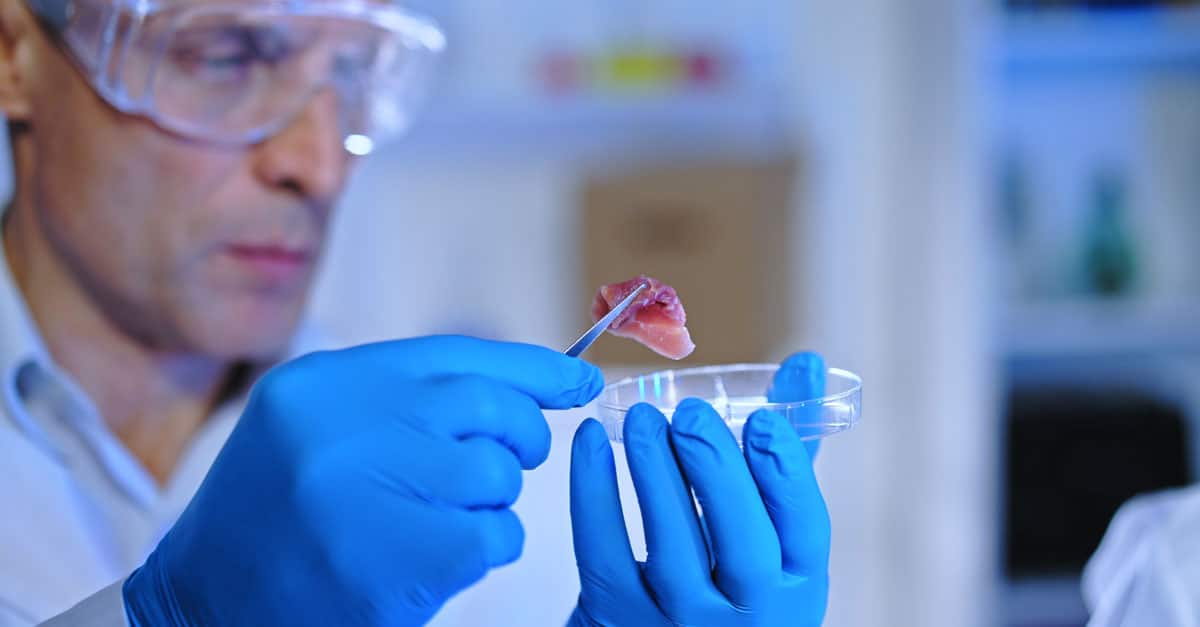The Process of Cultivating Lab-Grown Meat
The production of lab-grown meat begins with a small sample of animal cells taken from a biopsy or cell bank. These cells, such as stem cells or muscle cells are then placed in a nutrient-rich culture medium. This growth medium provides the necessary conditions for the cells to multiply and develop into muscle fibres that resemble conventional meat.
To create more complex structures and textures, scientists use a variety of scaffolding techniques, such as biodegradable scaffolds or 3D printing. These methods mimic the natural formation of tissues, resulting in a meat product that closely resembles traditional meat in composition and texture.
Sustainable and Ethical Alternative
Lab-grown meat has the potential to revolutionise the food market in several ways. First, it offers a more sustainable alternative to traditional meat production. By eliminating the need for large-scale animal farming, lab-grown meat can significantly reduce greenhouse gas emissions, deforestation and water consumption.
Second, lab-grown meat has the potential to address ethical concerns related to animal welfare. Because it is produced without the slaughter of animals, it eliminates the need for intensive farming practices and the associated animal suffering.
Elevate Your Wealth Game: Empowering UHNWIs for Simplified Asset Management. Altoo Platform Preview
Finally, lab-grown meat has the potential to improve food security by reducing reliance on traditional agriculture. With the world’s population expected to reach 9.7 billion by 2050, finding sustainable and efficient ways to produce protein is critical.
Pioneers in the Lab-Grown Meat Industry
While the technology is still in its early stages, pioneering companies are making significant progress in developing sustainable and delicious alternatives to traditional meat. With continued research, investment and consumer acceptance, lab-grown meat has the potential to become a mainstream option in the future.
Several companies are at the forefront of the lab-grown meat revolution, working tirelessly to bring this innovative technology to market. Let’s take a closer look at three of the industry’s most prominent pioneers.
Mosa Meat
Mosa Meat, a pioneer in the lab-grown meat industry, was founded in 2015 by Dr. Mark Post and Peter Verstrate. The company rose to prominence after launching the world’s first cell-cultured hamburger in 2013, and has sincerely defined its methods and attracted significant investment. MosaMeat cultures muscle cells from a small sample, eliminating the need for large-scale animal farming. They claim to produce several thousand burgers from a single cell sample. Their emphasis on sustainability positions them to dramatically impact the future of meat production.
Eat Just Inc.
Founded in 2011, Eat Just Inc. is a food startup focused on transforming food production and consumption. Known for plant-based egg substitutes like Just Egg, the company is also contributing to the lab-grown meat industry. In 2020, the company will be the first to receive regulatory approval to sell lab-grown chicken in Singapore. Using a bioreactor to grow animal cells, they produce slaughter-free chicken nuggets. With its commitment to sustainability, Eat Just has the potential to influence the future of lab-grown meat.
MeaTech3D
Israel-based MeaTech3D is using 3D bioprinting technology to create lab-grown meat as a sustainable alternative to traditional livestock farming. While they have made progress with beef and chicken, their current focus is on cultured pork. MeaTech3D distinguishes itself by prioritising the flavour and texture of cultured meat in addition to protein production. With a recent patent application for a refined production process, they’re committed to making lab-grown meat a palatable choice for consumers.









